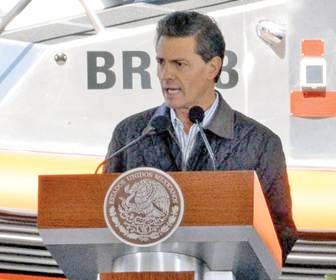La Voz de la Frontera
April 17, 2015
By José Mercado
The Mexican government has acted to show it is committed to protecting the environment. It has set a two year ban on gill-netting and increased the vigilance against the poaching of totoabas. The endangered vaquita whale, endemic to the Gulf of California, are frequently drowned after becoming caught in gill-nets. President Enrique Peña Nieto was recently in San Felipe to announce a four point protection plan.
 The president reiterated his commitment in principle with the delivery of navigational equipment for the coastal defense of endangered species at closure of the ceremonies, after noting that Mexico contains 10% of the world's diversity.
The president reiterated his commitment in principle with the delivery of navigational equipment for the coastal defense of endangered species at closure of the ceremonies, after noting that Mexico contains 10% of the world's diversity.
In reaffirming their commitment to environmental protection, Peña Nieto introduced four points, the first of which was to extend the polygon of protection for endangered species like the vaquita and totoaba. This step utilizes the Secretariats of Marina -in coordination with other bodies, to enhance surveillance to prevent poaching.
The second point, he said, includes the compensation that the federal government will give fishermen to withstand the two year ban, which limits the capture of other species. The fisherman were also invited to join the process of monitoring the area.
The third point includes the strengthening of inspections and surveillance, for which he mandated the authorities of Sedena, Semar and Sagarpa to coordinate their surveillance and patrol efforts in the area.
As a fourth point, the President stressed the importance of promoting new eco-friendlier forms of fishing and strengthening the commitment to maintain sustainable activities to benefit the region.
Shortly after the delivery of speedboats equipped with the most advanced systems for navigation and surveillance, President Peña Nieto, attended by his entourage, visited the monitors that controlled the surveillance programs, established by the Navy, Department of Defense and Sagarpa.
A cool breeze accompanied the event that lasted just over an hour.
On arrival of the president to a patio center where the event took place, members of the Secretariat of National Defense detonated a 21 gun salvo.
The event was attended by the Secretaries of the Navy, Vidal Francisco Soberon; Sedena, Salvador Cienfuegos Zepeda; the holder of SEDESOL, Rosario Robles Berlanga; SEMARNAT, Juan José Guerra Abud and SAGARPA, Enrique Martínez y Martínez, as well as the governors of Nayarit, Roberto Sandoval Castañeda and Sinaloa, Mario López Valdez.
ASK CHINA TO STOP PURCHASING TOTOABA
With the ban on the capture of totoaba and vaquita, President of the World Wide Fund for Nature, Omar Vidal Pinzon, called for the Presidents of the United States and China to stop trafficking in the throat bladders of the totoaba, a much-sought commodity because of the high prices they fetched, the reason for the poaching of the protected species.
"I am calling for President (Barack) Obama and the Republic of China to employ first-line diligence, for the USA to stop the contraband from crossing its borders and for China to stop buying the food that has become a very attractive dish in that country.
Special guest US ambassador in Mexico, Anthony Wayne, was clear in stating that the population of vaquita whales is down to around 100, after a report of just over 200 a few months ago. This news has increased the fear that the species is near extinction.
In the world, he said, there are a number of animal species that are endangered, as in the case with the vaquita, which has been decimated by gill nets, a situation he compared to the China panda.
The president of the World Wide Fund for Nature acknowledged the policies that were generated for the intervention of the authorities of the three branches of government and the involvement of the Secretariats as SEMARNAT, SAGARPA and Navy Department, who have made a strategic alliance to strengthen surveillance and protect the natural resources.
New surveillance crafts
The delivery of 17 new vessels was made to the area. They will maintain surveillance in selected locations and are equipped with technology that allows them quick, high-speed travel.
Of these, two boats remain in the port of San Felipe to strengthen actions against poaching. These are in addition to 19 checkpoints and 71 points of interception.